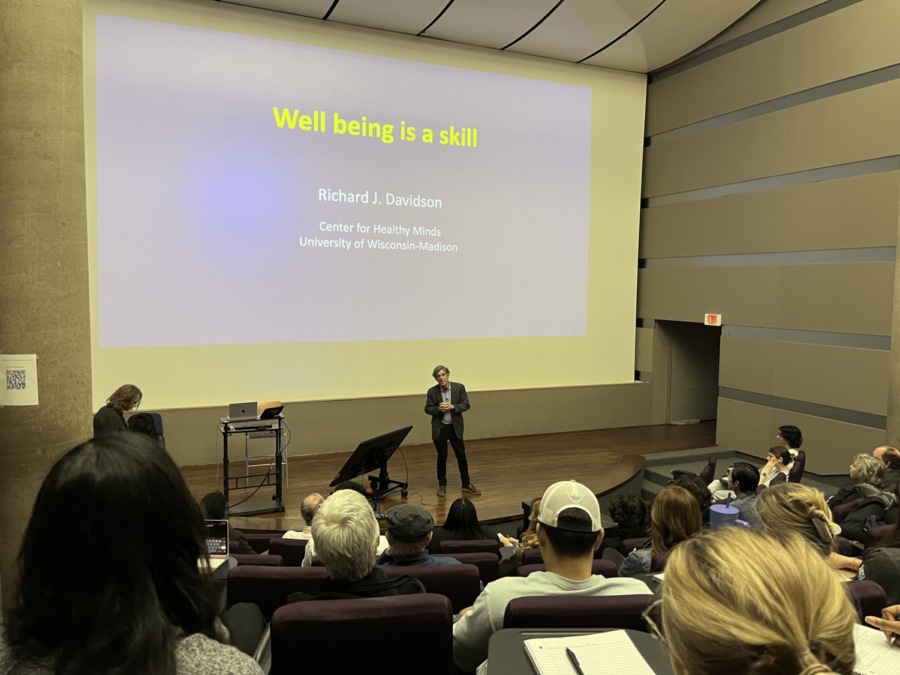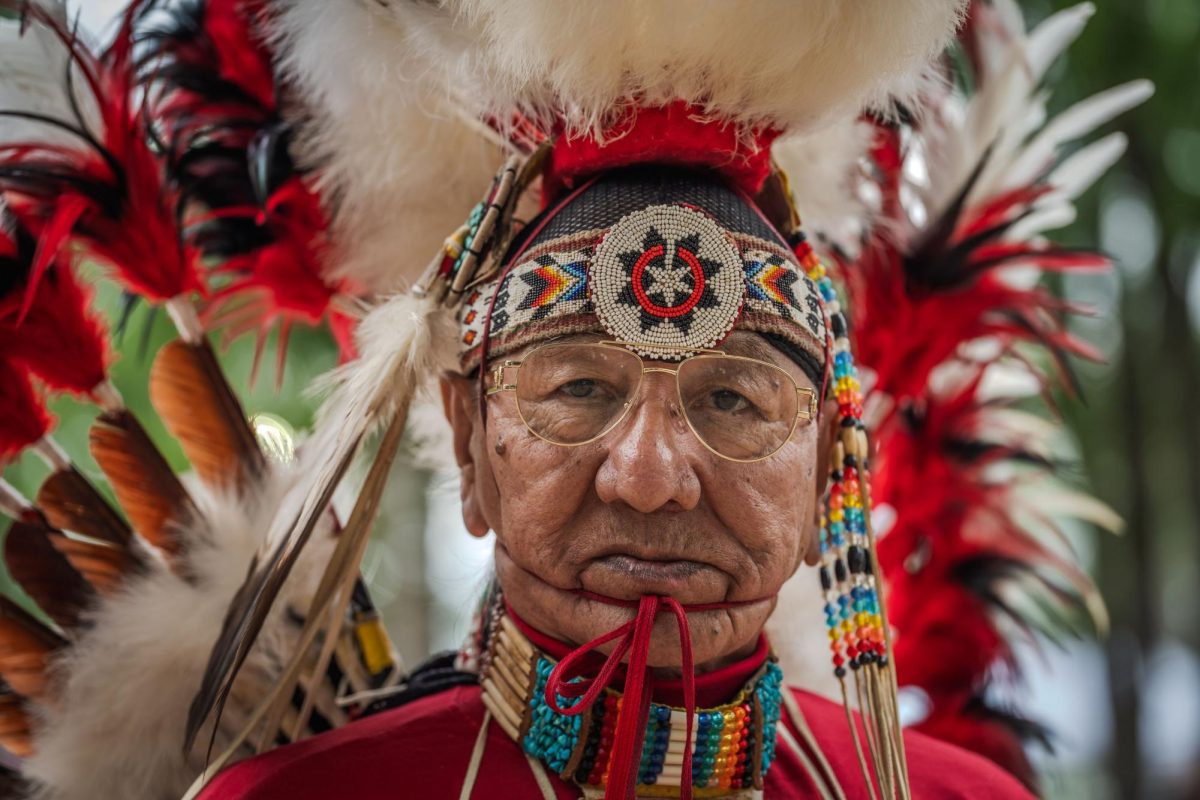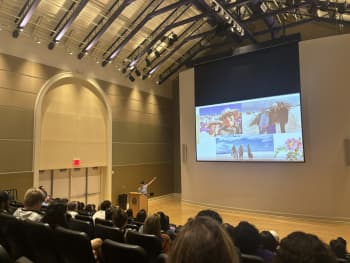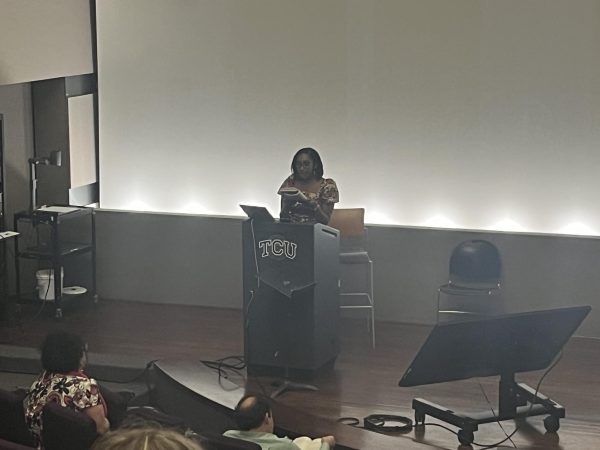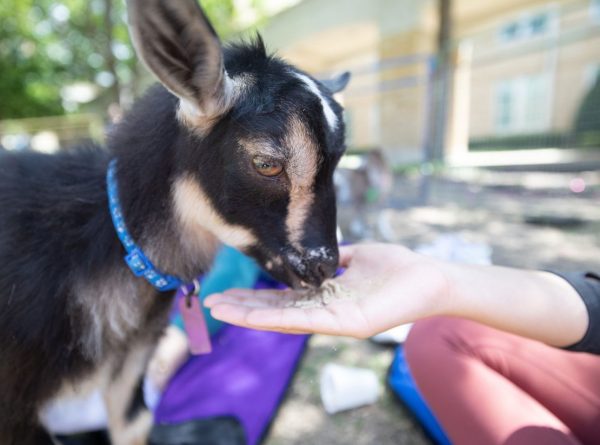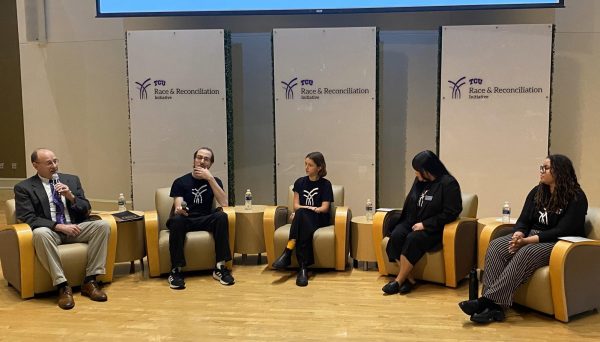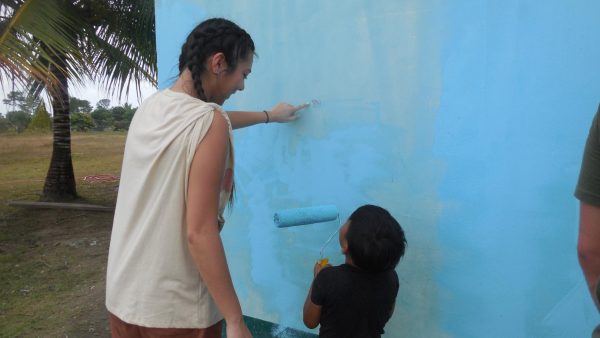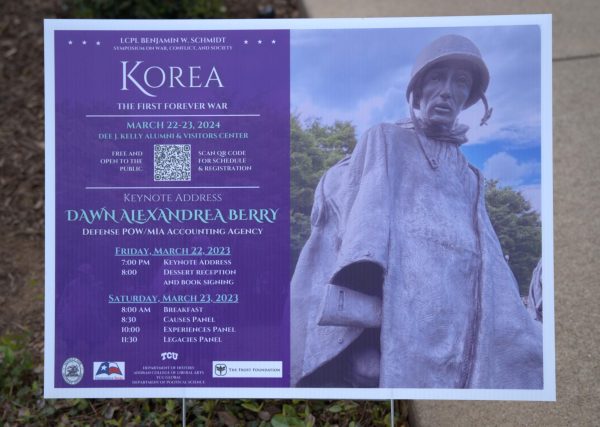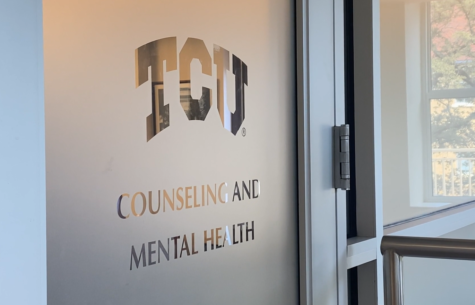TCU CALM kicks off month-long symposium with keynote address on well-being
Dr. Richard J. Davison gives a keynote address for the Ronald E. Moore Humanities Symposium in the Moudy Auditorium on March 1, 2023. (Walter Flanagin/Staff Writer)
Published Mar 20, 2023
Well-being is a skill one can learn and practice, said Dr. Richard J. Davidson, a psychologist who spoke at TCU at a humanities symposium on Wednesday.
Davidson, founder and director of the Center for Healthy Minds at the University of Wisconsin-Madison, said he dedicated his life to studying adversity in the brain, including neural responses to depression and fear.
In 1992, he met the Dalai Lama, the highest spiritual leader of Tibetan Buddhism. He challenged Davidson to use the tools of neuroscience to study the brain’s capacity for kindness and compassion, rather than adversity.
TCU’s Department of Philosophy and CALM (Compassionate Awareness and Living Mindfully) sponsored this year’s Ronald E. Moore Humanities Symposium. The symposium, which started in 2003, takes place every three years.
This year’s discussion was planned for March 2020 but had to be rescheduled because of the pandemic. The “March Mindfulness” themed symposium will conclude with a second keynote address on March 30.
CALM studies started at TCU in 2012.
The organization is “dedicated to creating a culture of belonging and promoting student and community-wide flourishing,” said Blake Hestir, a professor of philosophy at TCU and the director of the symposium.
The organization offers an array of events each semester: film screenings, hosting speakers, meditation sessions and retreats.
Hestir said this year’s topic of “What is well-being?” brings “a nice mix of intellectual engagement with evidence-based contemplative practice related to being and living well.”
Resilience and well-being
Davidson’s lecture highlighted research he uses to understand how to improve two aspects of people’s lives. One is resilience, or how long it takes to recover from a traumatic event. The other is well-being.
Well-being encompasses psychological factors such as distractibility, loneliness, a sense of purpose and a capacity for kindness and happiness, Davidson said.
He said one of his goals is to find out how to “relieve suffering through a scientific understanding of the human mind.”
Hestir said college students have a sense of what well-being is.
“We all do,” Hestir said. “Though, there are so many things that draw our attention away from it; many of us live with a certain forgetfulness of how to live well.”
The professor shared that the ruts of life can be great teachers.
The first part of Davidson’s lecture focused on the ways the psychological factors of well-being affect mental health, happiness and life expectancy.
Davidson’s solutions are based on the idea that the structure and function of the brain can be changed after training and practicing mindfulness techniques such as meditation and compassion training. He argues that people can alter their brains to become kinder and happier people.
Davidson listed four “pillars of well-being” which, according to evidence from randomized clinical trials, can improve psychological well-being. The four pillars are awareness, connection, insight and purpose.

Benefits of mindfulness
Davidson cited research on the four pillars to show that the brain can be trained. He found that long-term meditators tended to be less distracted, happier and recover more quickly from stressful situations.
Research on compassion training showed that it is possible to make people more altruistic. Compassion training can also help eliminate implicit bias (unconscious negative attitudes toward certain groups). Davidson said these results were “proof of concept” that mindfulness practices can help reduce some inequities and mental health problems in society.
Davidson compared the acceptance of mindfulness as a health practice to brushing teeth.
“We didn’t start out brushing our teeth,” the psychologist said. “If we spent half as much time as we do brushing our teeth (practicing mindfulness) the world would be a different place.”
Davidson said people can get measurable health benefits from spending just five minutes a day in silent meditation or reflection. The free app, “Healthy Minds Program,” features active meditation practices designed to fit into a busy lifestyle.
“The average adult spends 47% of their waking life not paying attention to what they’re doing,” Davidson said. “Imagine a world where teachers are fully present for their students, parents fully present for their children, physicians fully present for their patients.”
After the lecture, Davidson answered questions from the audience.
“It is central to our mission that all students have a voice and be heard,” Hestir said.
Isabella Baddour, a junior political science major, said the lecture was insightful.
“He talked about well-being being a skill that you can learn and not just something that you’re born with, either you have or you don’t.” Baddour said. “And how you can kind of train your mind to be relaxed, be less stressed, and be more positive.”
Baddour said the scientific evidence made her want to incorporate meditation or breathing practices into her daily life.
The 2023 Ronald E. Moore Humanities Symposium will conclude with an address by Rhonda V. Magee, Professor of Law at the University of San Francisco, at 7:30 p.m. Thursday, March 30 in the Brown-Lupton University Union Ballroom. Her talk is titled, “Deepening the Inner Work of Flourishing Together: Practicing Ethically-grounded, Socially-engaged Mindfulness in Troubled Times.”
Hestir said student activities such as an embodiment workshop and meditation sessions are also planned to be part of March Mindfulness.


